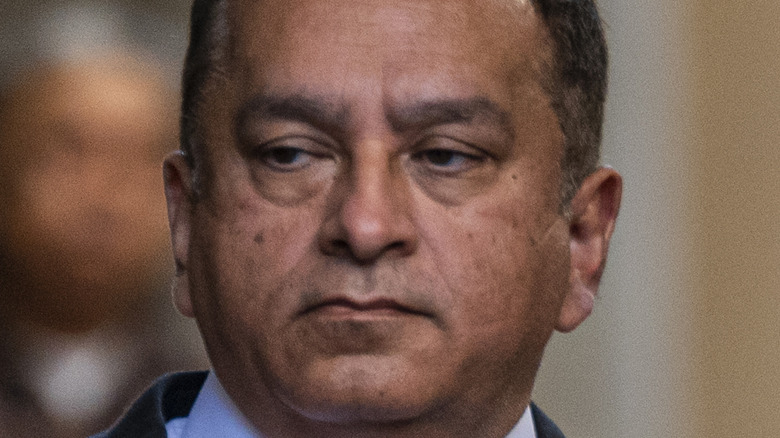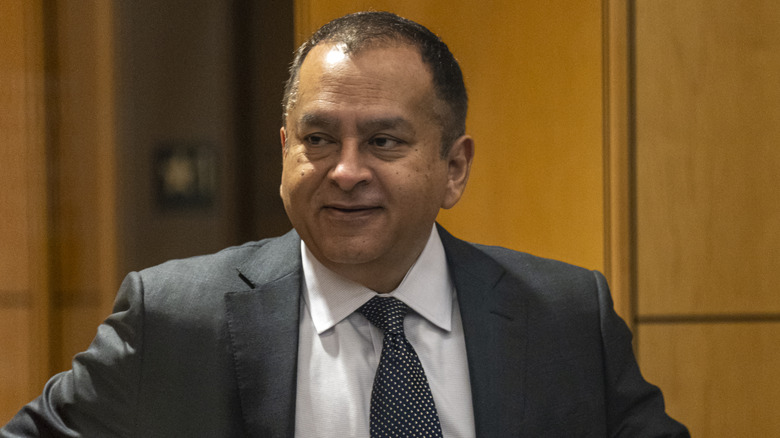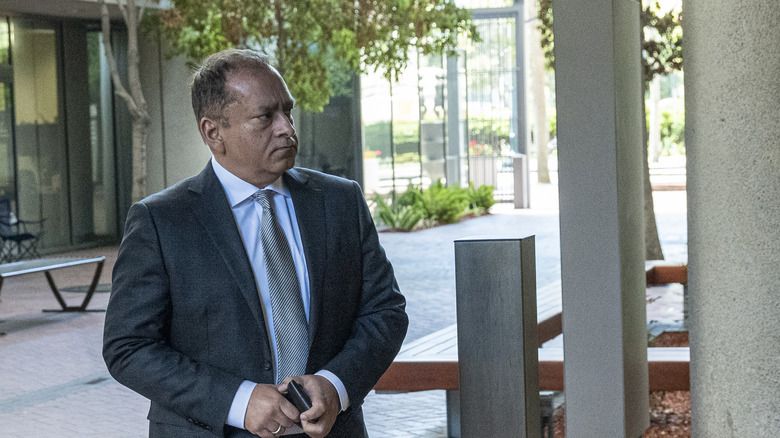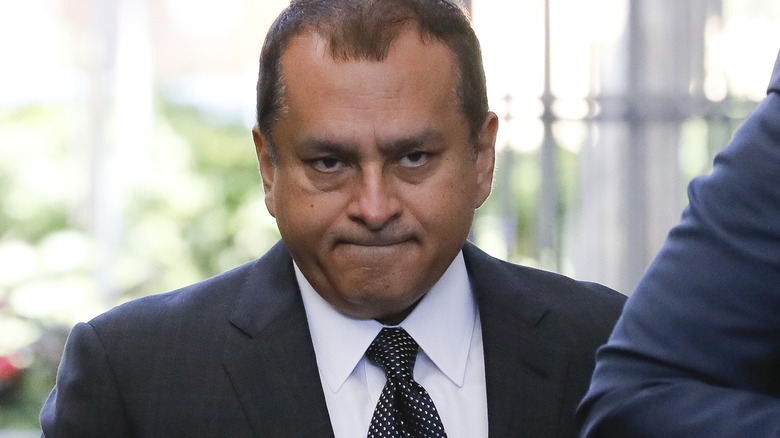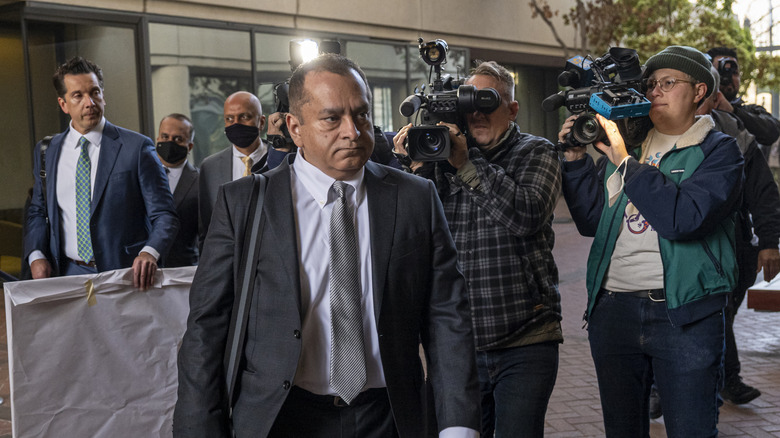How Much Control Of Theranos Did Ramesh 'Sunny' Balwani Really Have?
Last week, Ramesh "Sunny" Balwani, the former COO of the scandal-ridden health startup Theranos, was found guilty of defrauding both patients and investors of the company, per CNN Business. The trial had been long and contentious — beginning in March 2022, it only ended in July the same year and necessitated four whole days of juror deliberations. Part of the issue was separating Balwani's involvement from that of Elizabeth Holmes, who not only founded Theranos but was also his ex-girlfriend.
Throughout the collapse of Theranos, many have questioned just how much Balwani was to blame. On the one hand, he was the COO of the company and was known for his tight control over all aspects of how Theranos was run. On the other hand, he invested his own money into the start-up, made little money from the venture, and did not have a background in science or chemistry. In light of these questions, here is a run-down of Balwani's history with Theranos and Elizabeth Holmes.
Sunny Balwani had long been unofficially involved
Elizabeth Holmes sensationally made headlines in the Fall of 2021 when she accused Sunny Balwani of subjecting her to an emotional and physically abusive relationship. While it remains to be seen whether their romance was as abusive as Holmes alleges, there is no doubt their personal history is both long and questionable at best.
According to The Wall Street Journal, Balwani first met Holmes when she participated in a Mandarin course in Beijing the summer before she started her freshman year at Stanford University. Balwani, who was 37 years old at the time, took Holmes under his wing under the guise of a mentor-mentee relationship. The two stayed in touch after the course ended, and Holmes considered him an unofficial advisor to Theranos during its early days. Though Balwani was not hired by the company at this time, his influence was apparently so great that "it wasn't unusual for Ms. Holmes to start sentences with 'Sunny says.'"
By 2005, Holmes and Balwani were in a secret romantic relationship, with Balwani having more and more input into the company as their romance grew. However, Holmes later claimed that Balwani's position as boyfriend allowed him to control almost every aspect of her life, both in the personal realm and the work one. In her trial, Holmes submitted pages of written notes scrawled with what she claimed were the rules and goals that Balwani had dictated to her (via Fortune).
Sunny Balwani officially joins the company
Looking at a time-line of Theranos investments, it's clear that Elizaeth Holmes was able to fundraise money from the beginning. According to Investopedia, Theranos received nearly $7 million during its first round of funding in 2004. It then received another $43.2 million in 2007.
But, Theranos's ability to raise money increased exponentially once Balwani officially joined the company in 2009. Ostensibly, part of this was because Balwani gave investors confidence: He not only pledged $10 million of his own money into the fledgling start-up, but he also came on board as COO to provide the experience that Holmes lacked, according to CNN. By 2014, Theranos had secured over $400 million in funding.
But, Balwani's new position as COO also created a different environment at Theranos. According to The Wall Street Journal, he was fanatical about removing any form of dissent in the ranks. He would yell at people in front of other employees, and he fired so many workers that employees created a new expression: to "disappear" someone. Those fired were often those who understood the weakness and impossibility of the technology they were touting.
Most alarmingly, Balwani even boasted about his power in text messages. "I am responsible for everything at Theranos," he brazenly told Holmes in one exchange, per NBC.
Sunny Balwani had a lot of different roles at Theranos
Sunny Balwani's presence in Theranos wasn't just internal. According to Dorothy Atkins of Law 360, he was both a liaison with investors and the person in charge of the mammoth Walgreens deal.
"Balwani told investors as late as [October] 2014 that Theranos would have more than $140 million in revenue by the end of the year, even though it had only $150k that year. Balwani said it would have +$2 billion in revenue in 2015, but it only had less than $2 million," she tweeted, in March 2022, about one example while summarizing the trial (via Twitter).
However, what ended up being even more problematic was Balwani's oversight of the blood testing lab and the Walgreens deal. Atkins said that Balwani was deemed the "primary contact" for the deal and that he lied about the pace and success of the Walgreens rollout. In addition, Politico confirmed that he oversaw the blood-testing lab. These two details ended up being particularly important because Balwani was charged with defrauding patients, not just investors — a charge that Holmes managed to avoid.
Since Theranos's demise, several former patients have spoken about the toll of receiving inaccurate results about their medical status; for example, one woman was told she was suffering a miscarriage when her pregnancy had actually been perfectly healthy (via CNBC).
Sunny Balwani still proclaims his innocence
However, despite the lawsuits and bad press, Balwani has maintained his innocence. One of his biggest points of contention is that he put his own millions into the company — not exactly the move of a man who knew the company's premises was fraudulent.
Nevertheless, his lawyers did not present an argument that was persuasive enough for the jury to believe that the 57-year-old was unaware of the deceit behind his claims and promises. On July 7, Balwani was found guilty on all 12 felony counts of defrauding both Theranos's investors and the patients who had relied on its shoddy technology. According to NPR, he displayed no emotion upon hearing the verdict. Though he has not yet been sentenced, the former tech entrepreneur faces up to 20 years in prison. In the meantime, his bail has been set for a whopping $750,000.
The prosecutors of the case were quick to triumph their victory over Balwani, Theranos, and "fake-it-til-you-make-it" culture.
"We are gratified by the jury's hard work and attentiveness to the evidence presented. We appreciate the verdict and look forward to the sentencing proceedings," U.S. Attorney Stephanie Hinds said of the verdict, per Politico. Meanwhile, Balwani is reportedly mulling an appeal, via CNN.
